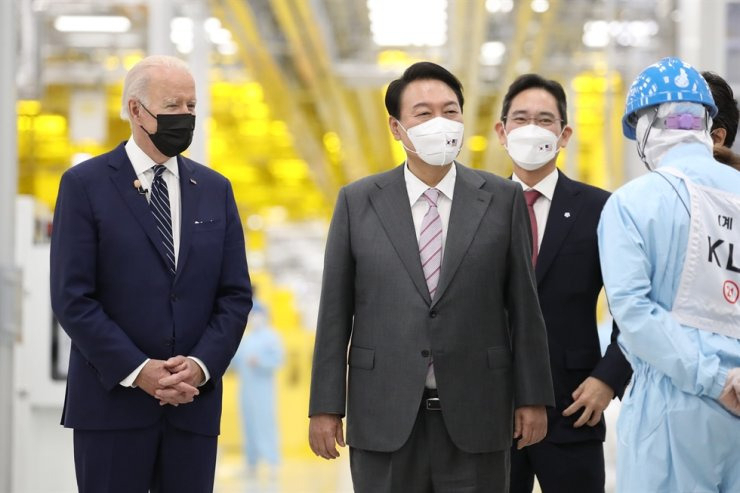Market Now
Diplomacy urged to ease concerns over US CHIPS Act
 |
US President Joe Biden (left) and President Yoon Suk Yeol (center) take a look around Samsung Electronics' semiconductor factory in Pyeongtaek, Gyeonggi Province, under the guidance of Samsung Vice Chairman Lee Jae-yong on May 20, 2022. (Yonhap) |
South Korea's chip industry is feeling pressured to take a side between the United States and China in the two superpowers’ strategic rivalry, as Washington recently disclosed some "unusual" requirements for its $52 billion semiconductor funding program aimed at securing an upper hand against Beijing.
Home to two of the world's largest memory chip makers, Samsung Electronics and SK hynix, the South Korean government has also raised concerns, as the US CHIPS and Science Act revealed to require that subsidy applicants share sensitive business information and excess profits with the US government.
"There are many unusual conditions that are completely different from general foreign investment subsidy requirements," South Korean Minister of Trade, Industry and Energy Lee Chang-yang said last week, after the US Department of Commerce revealed the specific provisions of the CHIPS Act on Feb. 28.
"We will actively work to negotiate on the provisions that can raise uncertainties and put burden on companies, to alleviate pressure," Lee added.
Highlighting the role of the government, experts and industry observers called for South Korean President Yoon Suk Yeol to make a deal directly with US President Joe Biden, as Yoon is set to make a state visit to the US in late April.
Under the new subsidy program, the US government plans to offer direct funding worth 5-15 percent of an applicant’s capital expenditure of a chip product in the US, with the amount not exceeding 35 percent of the costs.
For instance, Samsung Electronics is expected to receive up to $2.55 billion for its new $17 billion foundry plant that is under construction in Taylor, Texas, if it applies and qualifies for the program.
The hefty incentives, however, come with too many strings attached, industry watchers here say.
For one, firms in line for potential funding are required to provide sensitive operational information on products they plan to produce -- including production volume, materials and equipment – as well as their major clients.
In addition, those receiving more than $150 million in direct funding are asked to share a portion of any profit that exceeds their initial projection, meaning that they could be obligated to pay back up to 75 percent of the subsidy.
“Requiring companies to report on their production forecast is the same as asking for their business secrets, and it’s a very critical infringement of management rights,” Park Jae-geun, head of the Korean Society of Semiconductor and Display Technology and a professor of electronic engineering at Hanyang University told The Korea Herald.
Among other things, the biggest concern among chipmakers is the condition that limits the expansion of their Chinese operations, even though it’s crucial for them to secure product competitiveness by upgrading equipment and other production facilities there. The “guardrail” rule restricts recipients from making investments or expanding chip production in China or “countries of concern” for 10 years.
Subsidy recipients will also be asked to return the full amount of the funding if they are found to have been engaged in any joint research work or technology transfer efforts with a foreign country that raises a national security concern.
With an accumulated investment of some 33 trillion won since 2021, Samsung runs chip plants in the Chinese city of Xian, which produce 40 percent of its total NAND flash chips. Its crosstown rival SK hynix’s Wuxi plant in China is responsible for producing almost half the chipmaker’s DRAM production.
Currently, SK hynix is searching for a site for its planned $15 billion advanced chip packaging plant in the US, the company’s first production facility there.
“The general consensus within the industry is that the US government is requesting some very sensitive information and the demand is onerous,” an industry official told The Korea Herald under the condition of anonymity.
“But giving up the subsidy application is a tricky decision because the company could be seen as taking a side between the US and China.”
Another industry official also relayed concerns, but said local chipmakers are working to make room for negotiation together with the US government.
“There are factors that raise our concerns. But it is still in the early stage, and what has been announced is not the final result," the official said.
"It would take months for the US government to finalize the application review. We will do what we can to make room for negotiation.”
Experts say efforts among individual chipmakers would have a limited impact, and urged the government to play a more active role in easing industrywide concerns, especially on tricky issues like information sharing and investment in China.
"Korea's semiconductor value chain is closely interrelated with the US, Japan, Taiwan and the Netherlands, and it can be a big loss to lose that connection," Kang Jun-young, a Chinese studies professor at Hankuk University of Foreign Studies said. "So it is important that the country secures leverage within those bounds."
Park of the Korean Society of Semiconductor and Display Technology stressed Yoon should address and relay the industry's concerns during his summit with Biden planned for late April.
“The president (Yoon Suk Yeol) will hold a summit (with Biden) and he should be determined to make a deal, to at least increase the grace period for implementation,” Park said.
By Jo He-rim (herim@heraldcorp.com)



![[Global Finance Awards] Mirae Asset Securities' global top-tier ambition within reach](http://res.heraldm.com/phpwas/restmb_idxmake.php?idx=151&simg=/content/image/2024/11/27/20241127050077_0.jpg)
![[Global Finance Awards] Kyobo Life enhances insurance coverage for cancer, long-term care](http://res.heraldm.com/phpwas/restmb_idxmake.php?idx=151&simg=/content/image/2024/11/26/20241126050106_0.jpg)
![[Global Finance Awards] Kakao Bank bolsters SE Asia foray with Superbank partnership](http://res.heraldm.com/phpwas/restmb_idxmake.php?idx=151&simg=/content/image/2024/11/27/20241127050076_0.jpg)
![[Global Finance Awards] IBK boosts support for small businesses](http://res.heraldm.com/phpwas/restmb_idxmake.php?idx=151&simg=/content/image/2024/11/27/20241127050072_0.jpg)
![[Global Finance Awards] Shinhan chief pushes to boost corporate value](http://res.heraldm.com/phpwas/restmb_idxmake.php?idx=151&simg=/content/image/2024/11/27/20241127050074_0.jpg)
